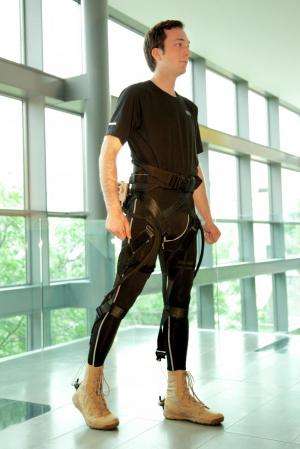Harvard's Wyss Institute awarded DARPA contract to further develop Soft Exosuit

The Wyss Institute for Biologically Inspired Engineering at Harvard University announced today that it was awarded a first-phase $2.9 million follow-on contract from the Defense Advanced Research Projects Agency (DARPA) to further develop a biologically inspired smart suit. The device, the Soft Exosuit, is intended to be worn comfortably under clothing and could enable soldiers to walk longer distances, keep fatigue at bay, and minimize the risk of injury when carrying heavy loads. Alternative versions of the suit could eventually assist those with limited mobility as well.
DARPA's Warrior Web program seeks to develop technologies to prevent and reduce musculoskeletal injuries for military personnel, but the same technologies could also have civilian applications. A reduction in such injuries could reduce long-term healthcare costs and enhance quality of life for wearers of the suit.
This is the first of a potentially two-phase contract, which enables Wyss Institute Core Faculty member Conor Walsh, Ph.D., and his team to build upon their earlier work, also funded by DARPA, demonstrating the proof-of-concept of this radically new approach to wearable robot design and fabrication. Inspired by a deep understanding of the biomechanics of human walking, the Soft Exosuit technology is spawning the development of entirely new forms of functional textiles, flexible power systems, soft sensors, and control strategies that enable intuitive and seamless human-machine interaction.
"While the idea of a wearable robot is not new, our design approach certainly is," said Walsh, who is also an Assistant Professor of Mechanical and Biomedical Engineering at Harvard's School of Engineering and Applied Sciences (SEAS) and founder of the Harvard Biodesign Lab.
The lightweight Soft Exosuit is designed to overcome the challenges of traditional heavier exoskeleton systems, such as power-hungry battery packs and rigid components that can interfere with natural joint movement. It is made of soft, functional textiles woven together into a piece of smart clothing that is pulled on like a pair of pants and intended to be worn under a soldier's regular gear. Through a biologically inspired design, the suit mimics the action of the leg muscles and tendons when a person walks, and provides small but carefully timed assistance at the joints of the leg without restricting the wearer's movement.
In a current prototype, a series of webbing straps positioned around the lower half of the body contain a low-power microprocessor and network of supple strain sensors that act as the "brain" and "nervous system" of the Soft Exosuit, respectively – continuously monitoring various data signals, including the suit tension, the position of the wearer (e.g., walking, running, crouched), and more.
"Over just a couple of short years, Conor and his team will work to fundamentally shift the paradigm of what is possible in wearable robotics," said Wyss Institute Founding Director Don Ingber, M.D., Ph.D. "Their work is a great example of the power of bringing together people from multiple disciplines with focused resources to translate what first seems like a dream into a product that could transform people's lives."
In addition to its military application, the team will collaborate with clinical partners to develop a medical version of the suit that can help stroke patients, for example, who often experience a slow, inefficient gait and could greatly benefit from walking assistance.
Provided by Harvard University